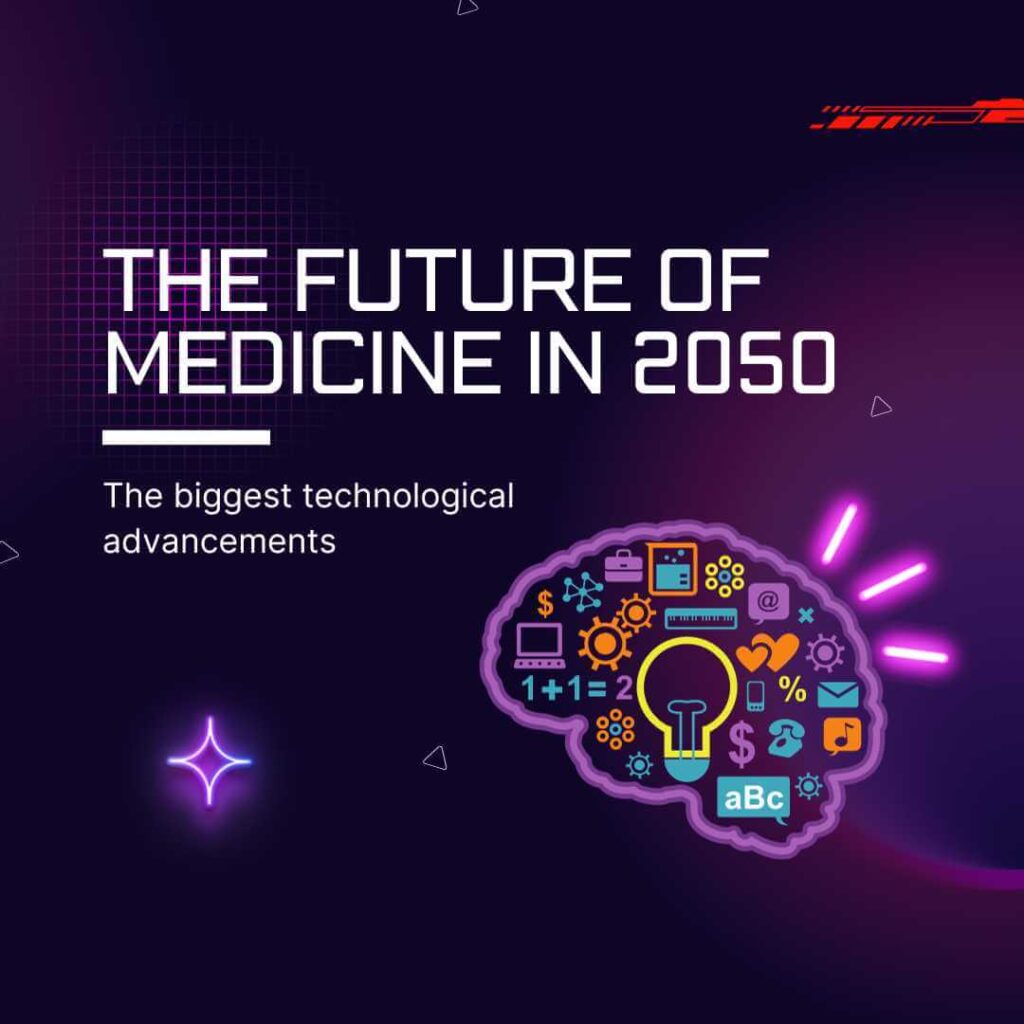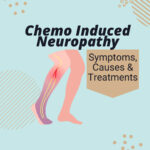The future of medicine in 2050 is poised to bring about groundbreaking advancements that will reshape the healthcare landscape. With rapid developments in technology, the way we approach medical treatments will undergo a profound transformation. From more accurate diagnostics to personalized treatment plans, the future holds great promise for improving patient outcomes and transforming healthcare delivery for higher efficiency and reduced healthcare costs.
In this blog, we explore what healthcare may look like in 2050 and what the biggest technological advancements are that will shape the future of medicine.

Key Takeaways
- The application of artificial intelligence and machine learning algorithms will make the diagnosis of diseases more accurate.
- Robots might be able to assist in surgeries to enhance surgical outcomes.
- Nanotechnology will allow more precise diagnostics and targeted drug delivery (nanomedicine) to increase effectiveness and reduce the side effects of medicines.
- Molecular imaging will enable early detection of diseases before symptoms appear, increasing the chances of recovery.
- Genetic engineering will increase treatment efficiency through customized treatments based on an individual’s genetic makeup.
- Treatments will be more personalized taking into account the vast amount of data collected by wearable devices, biosensors and implantable devices.
- Remote patient monitoring systems will reduce hospital visits and will bring good healthcare to remote locations.
- Gene editing will allow us to correct genetic mutations to cure genetic diseases.
- 3D printing will allow for custom made prosthetics and implants to fit each patient’s unique anatomy, improving overall success rates and patient satisfaction.
- Scientists may be able to grow organs and tissue in the lab, reducing long waiting lists and risk of organ rejection.
- Blockchain technology will allow secure sharing of patient data across healthcare providers.
Revolution of Healthcare Technology by 2050
By the year 2050, the future of medicine will be revolutionized by breakthrough technologies that will reshape healthcare practices. Let’s take a closer look at some of these advancements and how they will transform the field.
Artificial Intelligence (AI) and Robotics
Artificial intelligence (AI) can analyze vast amounts of medical data to provide accurate diagnoses and treatment recommendations. This means doctors will have access to more precise information when making critical decisions about patient care.
Robots can assist in surgeries, perform repetitive tasks, and even provide companionship for patients. With their precision and efficiency, robots can enhance surgical outcomes and improve patient experiences.
Nanotechnology for Targeted Drug Delivery
Nanotechnology involves manipulating materials at the nanoscale level to create new functionalities, such as targeted drug delivery systems.
Imagine tiny nanoparticles carrying medicines directly to affected cells or tissues in the body while sparing healthy ones. This targeted approach could minimize side effects and increase treatment effectiveness.
Nanoparticles could also be used for precise diagnostics, detecting health conditions at an early stage with high accuracy.
Advanced Imaging Techniques
Advanced imaging techniques such as molecular imaging allow visualization of biological processes at a molecular level.
Molecular imaging offers detailed insights into cellular functions, enabling early detection of diseases like cancer or neurological disorders before symptoms appear. With this technology, doctors can accurately assess disease progression and tailor treatments accordingly.
In addition to molecular imaging, other advanced imaging techniques like MRI (Magnetic Resonance Imaging) and CT (Computed Tomography) scans continue to improve in resolution and speed. These advancements will enable more precise diagnoses and treatment planning.
Personalized Medicines and Genetic Engineering Impact
Genetic Engineering
Genetic engineering is set to revolutionize the field of medicine in the future. With advancements in technology, a GP will be able to provide customized treatments based on an individual’s genetic makeup.
By targeting treatments to your specific needs, doctors can optimize outcomes and improve overall patient care.
Precision Medicine Approaches
As opposed to general treatment protocols, precision medicine aims to tailor therapies according to an individual’s specific characteristics. This includes factors such as their genetics, lifestyle choices, environmental influences, and even microbiome composition.
For example, if someone has a particular gene variant that makes them more susceptible to a certain type of cancer, precision medicine can help detect it early and implement targeted interventions.
Gene Editing
Gene editing tools like CRISPR-Cas9 have immense potential for curing genetic diseases by modifying faulty genes responsible for these conditions. Researchers are actively exploring ways to use gene editing techniques not only in research settings but also in clinical applications.
Imagine being able to correct genetic mutations that cause conditions like cystic fibrosis or sickle cell anemia at their root. Gene editing holds the promise of revolutionizing the treatment landscape for genetic diseases, potentially offering a cure where none existed before. While there are still challenges and ethical considerations to address, the potential impact of gene editing on healthcare is truly remarkable.
Healthcare Delivery Transformations
Virtual Reality and Augmented Reality in Medical Training and Education
In the future of medicine in 2050, virtual reality (VR) and augmented reality (AR) technologies will play a significant role in transforming medical training and education.
With VR, doctors, nurses, and other medical practitioners will have the opportunity to immerse themselves in realistic simulations that mimic real-life scenarios. They can practice complex surgical procedures or emergency interventions in a safe and controlled environment. This hands-on experience will enhance their skills, improve decision-making abilities, and boost confidence when dealing with critical situations.
Remote Patient Monitoring Systems for Real-Time Tracking
In 2050, remote patient monitoring systems will become increasingly prevalent, allowing individuals to track their health parameters from the comfort of their own homes. These systems utilize wearable devices equipped with sensors that continuously monitor vital signs such as heart rate, blood pressure, temperature, and oxygen levels.
The data collected by these devices is transmitted wirelessly to healthcare providers who can monitor patients’ conditions in real-time. This technology enables early detection of any abnormalities or changes that may require immediate attention. It also allows for personalized care plans tailored to each individual’s specific needs.
Remote patient monitoring systems offer numerous benefits such as reducing hospital visits for routine check-ups, minimizing healthcare costs, and empowering patients to take an active role in managing their health.
Additionally, access to this data will enable remote clinical trials for new medicines, new therapies, and faster clinical research.
AI and Smart Hospital Infrastructure
With its advanced algorithms, AI can analyze massive amounts of medical data, leading to more accurate diagnoses and personalized treatment plans. This technology has the potential to transform healthcare delivery, making it more efficient and patient-centric.
AI Algorithms for Accurate Diagnoses
AI algorithms have the ability to process vast amounts of medical data collected through the internet of things (IOT), including patient records, lab results, imaging scans, and research papers. By analyzing this information, AI can identify patterns and make predictions that help doctors make informed decisions about diagnosis and treatment options. This can significantly improve the accuracy of diagnoses and reduce errors in medical practice.
Streamlined Workflows with Smart Hospitals
Smart devices such as wearable sensors, smart beds, and monitoring equipment will continuously collect patient data and transmit it to a central system.
This real-time data sharing will streamline workflows by eliminating manual processes like paper-based documentation. Doctors will have instant access to patient information, enabling them to provide timely care without delays or errors and run more effective clinical trials. Smart hospitals can use predictive analytics to anticipate patient needs and allocate resources efficiently.
Medical Devices and Wearable Technology
Innovative Medical Devices for Real-Time Health Monitoring
One exciting development in the field of medicine is the emergence of biosensors and implantable devices. These cutting-edge technologies can monitor various aspects of our health, providing valuable insights into our well-being. By continuously tracking vital signs such as heart rate, blood pressure, and glucose levels, these devices enable early detection of potential health issues.
Imagine having a tiny device implanted under your skin that constantly communicates with your smartphone or smartwatch, giving you updates on your overall health status. This kind of technology could be a game-changer for individuals with chronic conditions or those who simply want to stay proactive about their health.
Revolutionizing Prosthetics and Implants with 3D Printing
Another groundbreaking advancement in medical technology is 3D printing. This revolutionary technique allows for the production of customized prosthetics and medical implants tailored specifically to each individual’s needs.
Gone are the days when people had to settle for generic prosthetic limbs that didn’t perfectly fit their bodies. With 3D printing, prosthetics can be created with precise measurements and specifications, resulting in a more comfortable and functional solution for those in need.
Furthermore, this technology opens up possibilities for the production of complex medical implants, such as hip replacements or dental implants. By utilizing 3D printing, these implants can be custom-made to fit each patient’s unique anatomy, improving overall success rates and patient satisfaction.
Regenerative Medicine
Growing Organs and Tissues for Transplantation
Regenerative medicine is an exciting field that holds great promise for the future of medicine in 2050. Scientists are exploring innovative ways to grow organs and tissues in the lab, offering hope to patients in need of transplants. With advancements in stem cell research, scientists can now manipulate cells to differentiate into specific types of tissue, such as heart muscle or liver cells.
In the future, we may see a world where organs can be grown on demand, eliminating the need for long waiting lists and reducing the risk of organ rejection. Imagine a future where someone with a failing kidney can receive a new one that was specifically grown for them in a laboratory! This could revolutionize transplantation and save countless lives.
Artificial Organs That Function Like Natural Ones
Another exciting possibility for the future of medicine is the development of artificial organs that can function just like natural ones. Through bioengineering, researchers are working on creating synthetic organs that mimic the structure and functionality of their natural counterparts.
Imagine a world where individuals with heart failure can have an artificial heart implanted that pumps blood just like a real heart. These advancements could significantly improve the quality of life for patients with organ failure and provide them with an alternative to traditional transplantation.
The Digital Economy and Healthcare Integration
Blockchain Technology: Secure Sharing of Patient Data
In the future of medicine in 2050, blockchain technology will play a crucial role in ensuring secure sharing of patient data across healthcare providers. With electronic health records becoming more prevalent, it is essential to have a system that guarantees the privacy and security of sensitive medical information. Blockchain technology offers a decentralized and immutable platform that can securely store and share patient data.
Challenges and Ethical Considerations in Future Medicine
Balancing privacy concerns with the need for comprehensive health data sharing poses ethical challenges.
In the future of medicine, there will be a growing need to share comprehensive health data to improve patient care and advance medical research. However, this raises concerns about privacy and the protection of personal information. Striking a balance between these two is crucial to ensure that individuals’ sensitive health data is not compromised while still allowing for meaningful collaboration and innovation in healthcare.
One challenge lies in determining who has access to an individual’s health information. Strict regulations and robust security measures must be put in place to safeguard against unauthorized access or breaches.
Another consideration is the ethical use of health data for research purposes. While sharing anonymized data can lead to significant breakthroughs in understanding diseases and developing new treatments, it also raises questions about informed consent and potential misuse of personal information. Establishing clear guidelines on how health data should be collected, stored, and shared ethically is necessary to maintain public trust in the healthcare system.
Ensuring equitable access to advanced healthcare technologies is a critical concern.
As medicine continues to advance rapidly, there is a risk of creating disparities in access to cutting-edge healthcare technologies. While these innovations have the potential to revolutionize patient care, they may also widen existing gaps between different socioeconomic groups or regions. It is crucial that efforts are made to ensure equitable access for all individuals regardless of their background or geographical location.
Financial barriers can limit access to advanced medical treatments and technologies. Expensive procedures or medications may be out of reach for many people, leading to unequal healthcare outcomes. Addressing these disparities requires innovative approaches such as government subsidies or insurance coverage that prioritize affordability alongside technological advancements.
Conclusion
In conclusion, here is what the future of medicine look like by 2050. In our prediction, the integration of healthcare technology, personalized medicine, and genetic engineering will revolutionize the way we diagnose and treat diseases. Furthermore, healthcare delivery will undergo significant transformations through telemedicine and virtual care, enabling remote access to medical services. AI and smart hospital infrastructure will enhance efficiency and patient care, while advancements in medical devices and wearables will empower individuals to take charge of their own health. The digital economy will further integrate with healthcare, creating new opportunities for innovation and collaboration.
FAQs
Will robots replace doctors in the future of medicine?
While robots will play an increasingly important role in healthcare, it is unlikely that they will completely replace doctors. Instead, robots will assist medical professionals by performing tasks such as data analysis, surgery assistance, and patient monitoring. The human touch and expertise provided by doctors are irreplaceable.
How will technology improve patient care in 2050?
Technology will revolutionize patient care in 2050 by enabling remote monitoring of vital signs through wearable devices, facilitating telemedicine consultations for convenient access to healthcare services, enhancing accuracy in diagnoses through advanced imaging technologies, and streamlining medication management with smart systems that ensure proper adherence.
Can we expect a cure for cancer by 2050?
While significant progress has been made in cancer research over the years, predicting a definitive cure for all types of cancer by 2050 is challenging. However, we can anticipate substantial improvements in early detection methods leading to higher survival rates. Targeted therapies tailored to specific cancer subtypes hold promise for more effective treatment approaches.
How will artificial intelligence impact the future of medicine?
Artificial intelligence (AI) will have a profound impact on the future of medicine. AI algorithms can analyze vast amounts of medical data quickly and accurately to aid diagnosis and treatment decisions. Machine learning models can identify patterns that humans might overlook.
- Best Red Light Therapy Device 2024 for Pain Management – 16 October 2024
- How To Improve Gut Microbiome – 26 May 2024
- Chemo neuropathy treatment: What to do? – 19 May 2024





